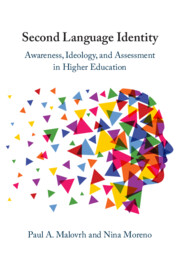Book contents
- Second Language Identity
- Second Language Identity
- Copyright page
- Dedication
- Contents
- Figures
- Tables
- Preface
- Acknowledgments
- 1 On Actors, Architecture, and L2 Advancedness in Higher Education
- Part I Advancedness and the L2 Learner
- Part II Variable Notions of Advancedness
- Part III Assessment, Identity, and Critical Language Awareness As Markers of Advancedness
- 8 Assessing Advancedness in the Age of Identity Construction and Global Citizenship
- 9 A Quantitative Analysis of L2 Identity and Critical Language Awareness
- 10 Imagining Global Citizenship and Intercultural Competence
- 11 Sociocognitive Awareness of L2 Advancedness in Higher Education
- Book part
- Bibliography
- Name Index
- Subject Index
10 - Imagining Global Citizenship and Intercultural Competence
A Mixed-Methods Analysis of L2 Learner Perceptions and Behavior in the Contexts of Identity Co-construction
from Part III - Assessment, Identity, and Critical Language Awareness As Markers of Advancedness
Published online by Cambridge University Press: 27 July 2023
- Second Language Identity
- Second Language Identity
- Copyright page
- Dedication
- Contents
- Figures
- Tables
- Preface
- Acknowledgments
- 1 On Actors, Architecture, and L2 Advancedness in Higher Education
- Part I Advancedness and the L2 Learner
- Part II Variable Notions of Advancedness
- Part III Assessment, Identity, and Critical Language Awareness As Markers of Advancedness
- 8 Assessing Advancedness in the Age of Identity Construction and Global Citizenship
- 9 A Quantitative Analysis of L2 Identity and Critical Language Awareness
- 10 Imagining Global Citizenship and Intercultural Competence
- 11 Sociocognitive Awareness of L2 Advancedness in Higher Education
- Book part
- Bibliography
- Name Index
- Subject Index
Summary
The present chapter uses a mixed-methods analysis to examine if L2 learners associate their learning with developing intercultural competence, and if these associations vary according to individual differences. It compares how L2 learners view language proficiency and sophisticated language use, and explores how they associate global citizenship with multilingualism. Responses to a survey were collected from N=67 L2 learners enrolled in either Tier I (basic language) or II (linguistics or culture) courses. Quantitative analyses revealed that age and instructional tier had a main effect on their level of intercultural awareness. Qualitative data showed that learners do not conceptualize language proficiency differently than sophisticated language use. Their definitions of global citizenship showed that they see multilingualism as the gateway to being a global citizen and language learning as the means to network with and learn from a global community. Agency and their roles as global citizens were only minimally mentioned; they self-identified primarily as L2 learners, not as L2 users with the ability to be agents of change on a global stage.
Keywords
- Type
- Chapter
- Information
- Second Language IdentityAwareness, Ideology, and Assessment in Higher Education, pp. 209 - 234Publisher: Cambridge University PressPrint publication year: 2023

